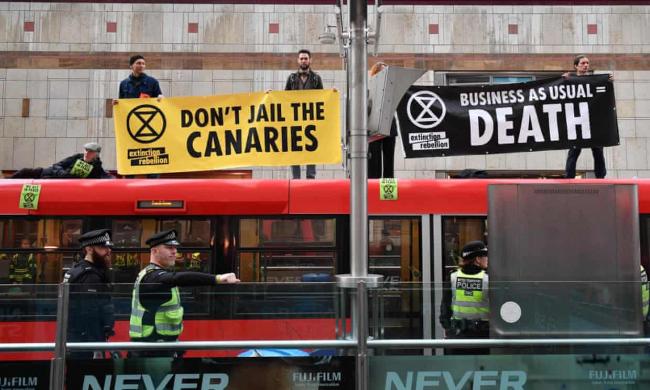Articles Menu

Dec. 10, 2021
Six climate crisis activists whose protest halted transport links serving London’s financial district have been acquitted by a jury.
The group of Extinction Rebellion protesters targeted the Docklands Light Railway (DLR), which runs commuters around the City, Canary Wharf and other parts of east and south-east London, saying they wanted to draw attention to the financial industry’s contribution to the climate emergency.
Five of them climbed on top of the train with banners that read “Business As Usual=Death” and “Don’t Jail the Canaries”; a reference to fellow protesters who were facing prosecution at the time. The sixth, Dr Diana Warner, glued herself to a train window.
They were charged with obstructing trains or carriages on the railway and, during their trial at Inner London crown court, acknowledged their roles in planning and carrying out the protest on 25 April 2019. They argued that their action was a lawful protest against government inaction on the climate crisis.
Warner, Ruth Jarman, Ian Bray, Richard Barnard, Nick Cooper and Phil Kingston were found not guilty in a unanimous verdict delivered by the jury on Friday.
“The defendants’ motives chimed with the concerns of 12 citizens representative of the wider public,” their lawyer Mike Schwartz, of Hodge Jones & Allen, said. “The jury all agreed the climate crisis requires radical action. This reinforces the importance of both civil disobedience and juries in a healthy democracy.”
Ian Bray, one of the defendants, said: “We are grateful for the love, compassion and moral clarity of the jury which enabled them to reach a unanimous verdict within an hour.”
His fellow protester, Richard Barnard, added: “Obviously, it’s great to win. But this cannot be the end until we can change the system so that all species, people and the planet are protected before profit. So we call on all people to go out and take action.”
Speaking after the acquittal, Ruth Jarman said: “I just want to thank the jury and bless them. I can’t believe they came so quickly to the right decision.”
Nick Cooper added: “I’m moved, but not overly surprised that they came to such a quick decision.”
The protesters claimed the jury’s verdict was an application of the principles established in June by the supreme court, which ruled that the exercising of protest rights could constitute a “lawful excuse” for obstructing the highway, even if the protest is considered disruptive.
They had been asked to consider the appeals of four people convicted at the high court, having earlier been cleared by a district judge in a lower court. In their contributions to the majority judgment, Lord Hamblen and Lord Stephens said: “There should be a certain degree of tolerance to disruption to ordinary life, including disruption of traffic, caused by the exercise of the right to freedom of expression or freedom of peaceful assembly.
“Political views, unlike ‘vapid tittle-tattle’, are particularly worthy of protection … The district judge took into account that the appellants were not a group of people who randomly chose to attend this event hoping to cause trouble. We consider that the peaceful intentions of the appellants were appropriate matters to be considered in an evaluation of proportionality.”
Giving evidence in their subsequent trial, the DLR protesters stressed that the attention they had paid to minimising the safety risk to the public and to themselves, while still attracting media attention, when they planned their action. And they expressed hope their case could influence future ones.
Government ministers have recently sought to crack down on forms of protest they deem a nuisance in response to actions by Extinction Rebellion and others. At the same time, they have championed freedom of expression, most notably in areas where ministers believe more conservative voices are not being heard.
[Top photo: Activists on the roof of a DLR train at Canary Wharf station on 25 April 2019. Photograph: Daniel Leal-Olivas/AFP/Getty]